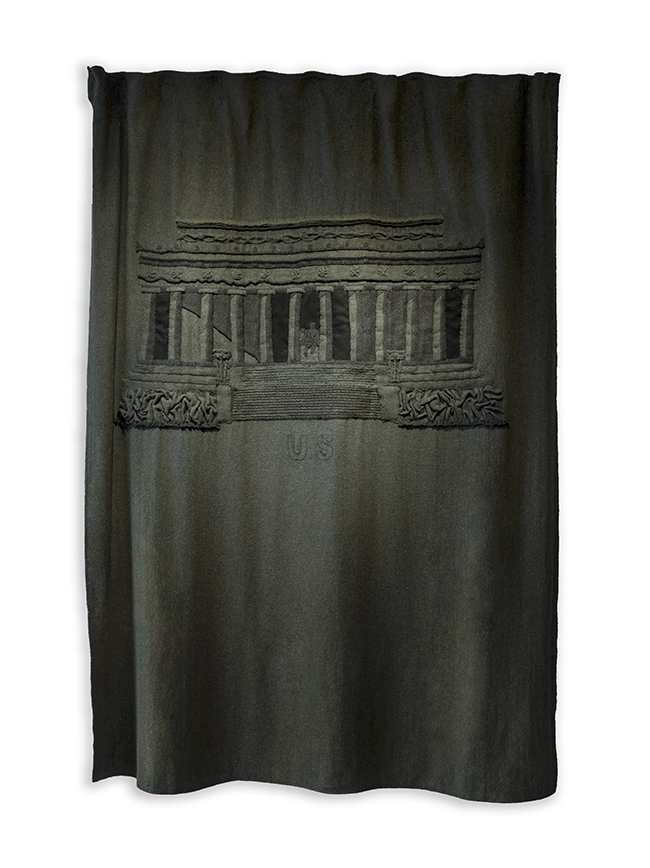Sebastian Di Mauro, an artist hailing from Australia, embarked on a transformative journey to the United States, a land far from his homeland. In this foreign terrain, he discovered not only the intricate interplay of identity but also a unique way to express it through his art.

Sebastian’s journey to the USA was not merely a change of scenery but a profound transformation of his life. Guided by his spouse, who calls Wilmington, Delaware home, he set out to explore the diverse nation he now called his own. The allure of the American Dream, often portrayed in television series and movies, had captivated him as a child, drawing parallels with the distant shores of Australia. However, the reality he encountered in the USA revealed stark contrasts, magnifying subtleties and intensifying his quest for identity, particularly as he found himself distanced from immediate family and lifelong friends.
As an artist, Sebastian Di Mauro found a unique medium to explore his journey and the intricate fabric of American identity: quilt making. The art of quilting has deep roots in Europe but took on a new life on American soil. English and Dutch settlers, bringing this tradition with them across the ocean, cultivated it across all strata of American society.
In its infancy, the American quilt was a utilitarian masterpiece, born out of the imperative need for warm bed covers. It was woven into the daily lives of early colonists who understood the value of resourcefulness. When blankets grew threadbare, they were patched, intertwined with other fabrics, or used as insulation between other covers. These quilts weren’t meticulously crafted heirlooms; they were functional guardians, dedicated to keeping people warm. Fast forward to the 21st century, and quilt making has evolved, now driven more by leisure and artistic expression.
As Robert Shawn stated in “Quilts: A Living Tradition,” “Quilts represent American possibilities and opportunities of freedom, democracy, equality, home, community, and individual expression.” Sebastian’s choice of this traditional American art form as his medium was a deliberate attempt to engage with the heart of American culture.
Money, in Sebastian’s journey through America, played a significant role in his survival and served as a powerful symbol of the nation’s unique reverence. The iconic “greenbacks,” as they are colloquially known, possess the power to acquire almost anything and stand as enduring symbols of historical events that have shaped this influential nation. These notes serve as the linchpin in international transactions, functioning as the world’s primary reserve currency.
With meticulous care, Sebastian etched the intricately engraved images found on the reverse side of US dollar bills onto US military blankets. These blankets serve as metaphors for nurturing, protection, comfort, and security. In this endeavor, Sebastian remains ever mindful of the powerful military presence of the United States worldwide, underscoring the global impact of this nation.
Each American banknote tells a story of significance, featuring iconic buildings that symbolize the nation’s heritage. For instance, the $5 note pays tribute to the Lincoln Memorial, celebrating Abraham Lincoln’s pivotal role in the nation’s salvation and the abolition of slavery. Meanwhile, the $1 note showcases the Great Seal of the United States, with its reverse side portraying a desolate landscape dominated by an unfinished pyramid of 13 steps, crowned by the Eye of Providence within a triangle. These narratives, etched in the fibers of American currency, echo the dynamic interplay between history, art, and identity.
Sebastian Di Mauro’s art is a profound exploration of his own identity as an immigrant in the United States and his connection to the culture and history of this nation. His use of quilt making, a tradition deeply rooted in American history, allows him to weave his personal narrative into the broader fabric of American identity. Through his work, he highlights the importance of understanding and embracing cultural differences while finding common ground in the rich tapestry of American life.
In his piece “Greenback series,” Sebastian’s use of US military blankets and cotton thread to recreate the intricate designs from American currency is a testament to his dedication and artistic vision. The juxtaposition of the utilitarian military blankets with the symbols of wealth and power found on US banknotes creates a thought-provoking dialogue about the intersections of security, comfort, and the pursuit of the American Dream.
Sebastian Di Mauro’s art transcends borders and brings together elements of his Australian heritage and his American experience, creating a visual narrative that speaks to the shared human experience of seeking identity and belonging. His work challenges us to consider the ever-evolving nature of culture, identity, and the stories we tell through art. Through his art, he has found a way to navigate the complexities of his journey and to share that journey with the world, making a mark in the realm of contemporary art that is both deeply personal and universally resonant.

